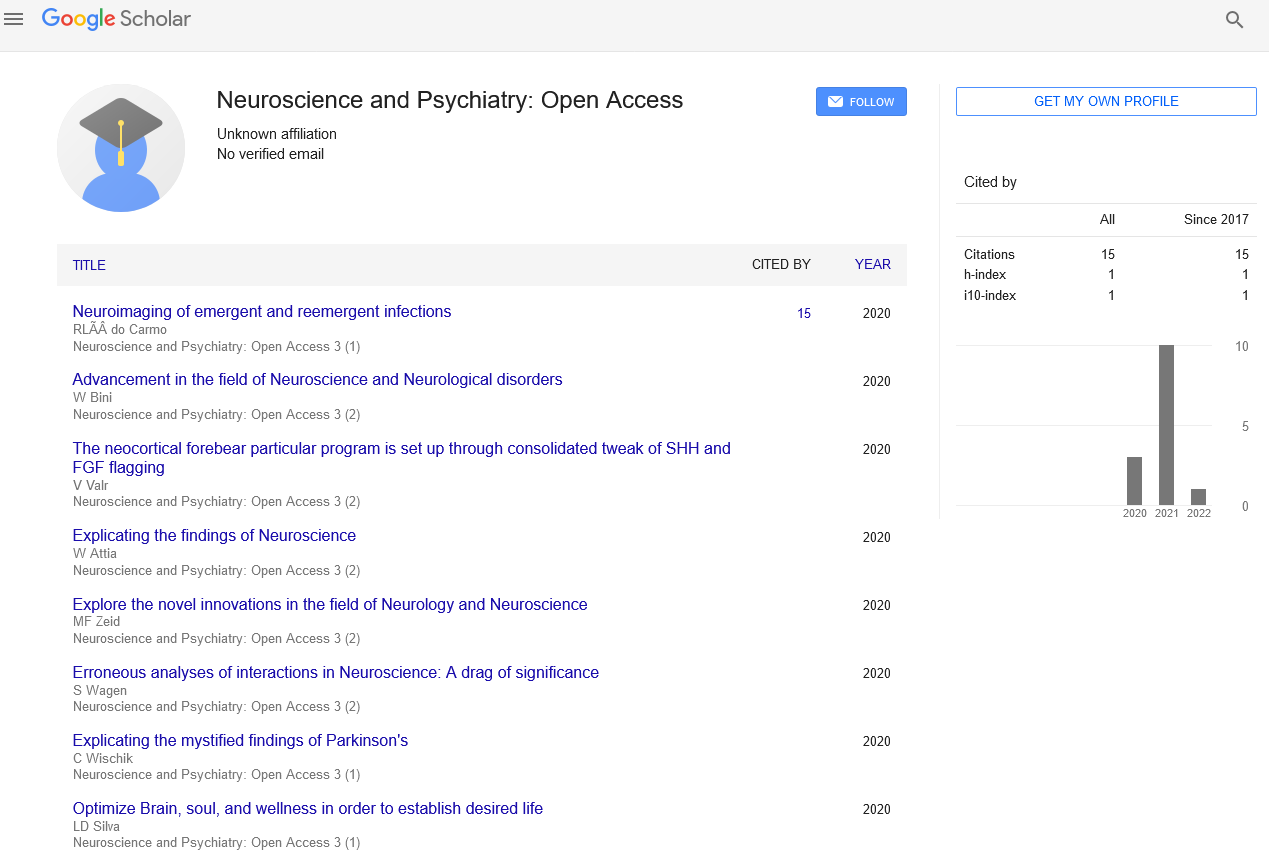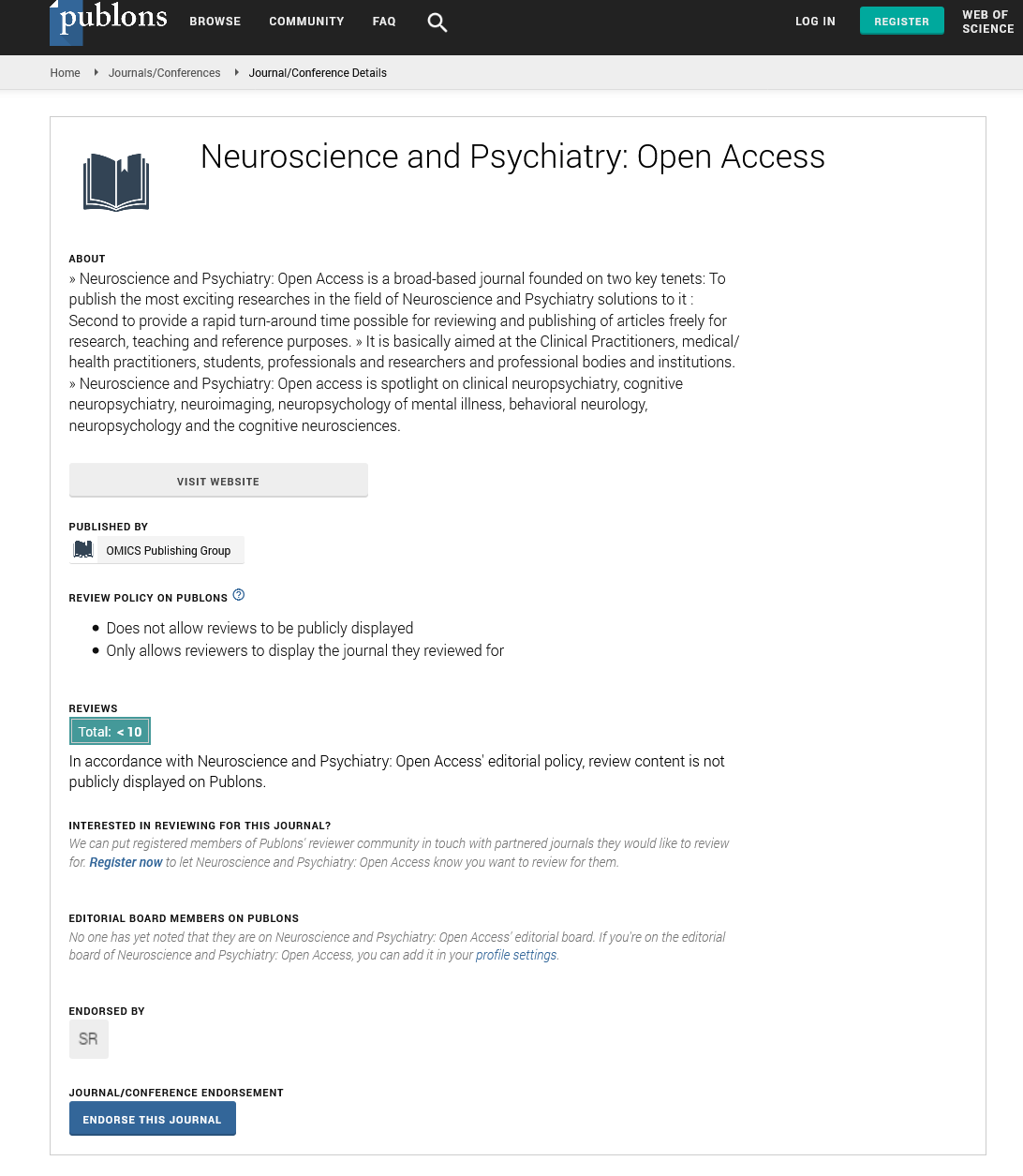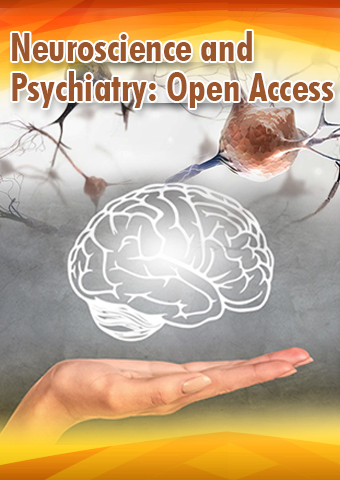Short Article - Neuroscience and Psychiatry: Open Access (2020) Volume 3, Issue 1
Explicating the mystified findings of Parkinson's
Claude Wischik
Eberdeen university, UK
Abstract
Parkinson’s Disease is a chronic and progressive disease of the nervous system and it became worse over time. It is the second most common neurologicald isorder. In ordinary Conditions, nerve cells exhibit in cerebrum and deliversa neurotransmitter called dopamine that oversees a development, feelings, and co-appointment yet because of unhealthy individual dopamine creation, hence the individual end up with control the development ordinarily. In Germany, has a lifetime prevalence of between 0.1 and 0.3% of the population Parkinson’s diseas e market is set to expand from $2.2 billion in 2014 to $3.3 billion by 2021, at a moderate Compound Annual Growth Rate (CAGR) of 5.8 percent, game-changing treatments will not be available for the future, according to business intelligence provider GBI Research. There are approximately 10 million individuals experiencing Parkinson's infection all around theworld. Parkinson's,as far it has a higher recurrence in the created nations. In Worldwide, itis estimated that 6.3 million people have PD with no differentiation for raceand culture. The age of onset is usually over 60-65, but it is estimated thatone in ten are diagnosed before the age of 50, and it can affect people intheir 40’s and younger. According toavailable statistics, 2 million people in Europe have Parkinson’s, which approximates to: 260,000 inGermany 200,000 in Italy 150,000 in Spain 120,000 in UK 117,000 inFrance. PD makes the second most common neurodegenerative disorder, that is it equates to a rate ofmore than 1 per 1000 people in Europe. It is difficult to tell how common Huntington’s Disease HD is in a population across the world. In Western Countries, it’s estimated that about five to nine people per 100,000 are affected by HD. A high population of HD has also been found in the Lake Maracaibo region of Venezuela where the prevalence of HD isabout 700 per 100,000. For more details please visit: parkinsons.alliedacademies.com Conference Highlights: Parkinson’s Disease Epidemiology of Parkinson’s disease Diagnosis of Parkinson's disease Insights and therapeutics: Parkinson’s disease Parkinson's disease Complications Pathophysiology and Pharmacology Clinical trials in parkinsonism Free radicals and aging in parkinsonism Managing life with Parkinson's disease Risk factors of Parkinson’s disease Huntington’s Disease Bradykinesia Alzheimer’s disease and Dementia Pediatric movement disorder Neuromuscular Disorder Neurosurgery Novel Therapeutics Target Audience Neurologists, Psychiatrists, Psychologists, Neurosurgeon, Director, Industries, Delegates, Clinical Specialists, Physicians, Neuroscientists, Community members, Lectures and Students from various Academics, Professors, Researchers, Scientists, Therapists. Major Associations around the Globe National Parkinson Foundation American Parkinson Disease Association (APDA) Parkinson’s disease Foundation Movement Disorder Society of Australia Parkinson's Unity Walk Movement Disorder Society of Japan Moroccan Neurological Society Movement Disorders Group Italian Society for the Study of Parkinson Disease, Extrapyramidal Diseases, and Dementia Ecuador Movement Disorders Group Austrian Parkinson's Disease Society Danish Movement Disorder Society Top universities500 globally working in the field of Parkinson's Disease University of Bath The University of Queensland University of Bristol University of Cambridge The Imperial College of Science and Medicine Duke University University of Milan Karolinska Institute University of Hamburg The University of Edinburgh University of Munich University of Rochester University of Zurich Leiden University University of Bristol University of Helsinki Uppsala University University of Freiburg University of Frankfurt Parkinsons 2020 is your best opportunity to reach the largest assemblage ofparticipants around the globe. Join, conduct presentations, exchange informationand connect with the current eminent and potential scientists to explore moreon neurosurgery, central nervous system, neuropharmacology and neurodegenerative disorders,make an impact with new innovations, developments and receive name recognitionand certificates signed by our world-class eminent organizing committee at this two days event. World-renowned speakers, the most advanced and recent techniques,developments and the newest updates in Neurology and the Neurological Disorders are hallmarks at this conference. At Allied Group, It is our ideology to bring maximum exposure to ourattendees, so we make sure the event is a blend that covers professionals suchas Neurosurgeons, Scientists, Neurologists, Doctors, Professors, Diagnostic Laboratory Professionals from academia & industry making the Parkinsons 2020 Annual Meeting a perfect platform. The conference will be organized around the Theme ‘Systematic Approaches and Progressive Therapies to treat Parkinsons and Movement disorders’. Our goal is todeliver an outstanding program that covers the entire spectrum of research &innovations in Neurology, care and share the cross-cultural experiences of various treatment procedures. Parkinsons 2020 is an annual meeting of Neurological and Neurological Professionals as well as committees to discuss the future of the Neurological Disorders in terms of collaboration, structures and organizational development. With members from around the world focused on learning about Parkinson’s and Huntington’ s Disorders and its advances; this is your best opportunity toreach the largest assemblage of participants from the Neurological Community. Conduct presentations, distribute information, meet with current and potentialscientists, make a splash with new discoveries in the Neurological treatment and diagnosis, and receive name recognition at this 2-day event. World-renowned speakers, the most recent techniques, developments, and the newest updates in the field of Neurological disorders and its various treatments.


